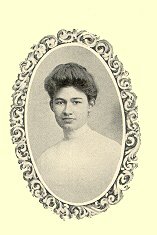
It is not only that we have learned to love the Palace and that a feeling akin to homesickness is filling our hearts as we say goodbye. There is another thought that comes to us tonight. We remember how, in the old allegory, when Christian had tarried several days in 'The Palace Beautiful' and rested in the chamber called Peace, whose window opened toward the sun rising, had gotten a view of the far-off Delectable Mountains, and then, having been armed with the armor of the Lord of the Hill, had left the Palace, his path led directly down into the valley, where Apollyon was waiting to be encountered. It was a rather rough path, and the old narrative says: 'So he began to go down, but very warily, yet he caught a slip or two.' And as we start out from our Palace no doubt we shall have to confess many times along the way that we have 'caught a slip or two.' As Christian viewed in the far-off distance the Delectable Mountains, so we have gotten here some vision of the broad and happy life toward which we are striving. We have rested a little in the chamber called Peace, and, best of all, we have received an equipment by means of which we hope that we shall be able to cope with and to overcome some of the real difficulties of life. And now the time has come for us to go down the hill and put to the test this armor of ours. And while for the moment we linger and hesitate in starting on the way, yet we do not shrink from that which lies before us.
But now we ask ourselves the question: What is this equipment that we have spent the last four years to gain? There isjust on e of its many phases that is suggested to us by our class motto: perhaps it is the greatest one. The motto is ![]() - She who conquers herself conquers all things. Have we not learned here a little of what is meant by this conquest of self? It means ruling our impulses instead of being ruled by them; learning to do the right thing at the right time; fitting our daily actions to the ideal that we have placed before us. It means the rule of a higher over a lower self. And do we not feel that this - the truest kind of self-control, which determines so largely our efficiency or inefficiency in the world - is about the best gift that our college life has brought to us?
- She who conquers herself conquers all things. Have we not learned here a little of what is meant by this conquest of self? It means ruling our impulses instead of being ruled by them; learning to do the right thing at the right time; fitting our daily actions to the ideal that we have placed before us. It means the rule of a higher over a lower self. And do we not feel that this - the truest kind of self-control, which determines so largely our efficiency or inefficiency in the world - is about the best gift that our college life has brought to us?
How we wish that we had been more ready to receive, that we had learned more perfectly this hardest and greatst of lessons, that we had been more careful to choose the best armor that the Palace afforded! But we may not go back now; we must face and strive to meet the obligations that are upon us. For what other reason has the Lord of the Hill permitted us to tarry in the Palace Beautiful than that wwe might keep the straighter course hereafter, make fewer slips by the way; that, having had a view of the finest lands before us, we might be content with no nearer, easier goal? If we have been expecting to idle along the rest of the way, we have had no right to the pleasures of the Palace.
We are feeling tonight a two-fold obligation; first, as college graduates, and then as graduates of The Woman's College of Baltimore. We have thought much of what our Alma Mater has meant to us now; now- not presumptuously, but thoughtfuully and earnestly - we think of what each one of us may mean to her. Any succss of ours will in some measure be hers; in the same measuure, our dishonor must be hers. So as we have come tonight to plant our ivy, which may keep our memory green in the years to come, we say once again words which other classes have said from year to year, but which have a meaning none the less inspiring to us. As the ivy, planted in favorable soil, keeps right on growing, taking its nourishment from the soil about it, from the sun and the rain; as in the years to come it will give added beauty to these college walls, so may we, the members of nineteen three, getting the inspiration for growth from the favorable associations of our Alma Mater, keep on growing, not content until we have attained our very best development; that in our growth we may adorn the name of our college with increasing glory and honor.
ANNA HASLUP.
| |
 |